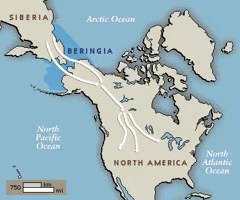Early Humans and the Neolithic Revolution
0.0(0)
Card Sorting
1/20
Earn XP
Description and Tags
Study Analytics
Name | Mastery | Learn | Test | Matching | Spaced |
|---|
No study sessions yet.
21 Terms
1
New cards
Neolithic Revolution
transition from hunting lifestyle to settled agriculture lifestyle
2
New cards
Domestication
adapting animals for human use
3
New cards
Ice Age
any period of time during which glaciers covered a large part of the earth's surface
4
New cards
Neanderthal
a human species which had heavy bones and moved slowly
5
New cards
Homo Erectus
a human species which was the first to move out of Africa
6
New cards
Homo Sapiens
the only surviving hominid; thin fingers and advanced brains
7
New cards
Nomadic lifestyle
A lifestyle in which people and communities followed the movements of animals
8
New cards
Bering Land Bridge
A land bridge between Siberia and Alaska that was exposed during the most recent Ice Age when the waters of the Bering Strait receded

9
New cards
glacier
A large mass of moving ice and snow on land
10
New cards
nomad
A member of a group that has no permanent home, wandering from place to place in search of food and water
11
New cards
evolution
Change in a kind of organism over time; process by which modern organisms have descended from ancient organisms.
12
New cards
bipedal
the ability to walk upright on two legs
13
New cards
hunter-gatherers
Nomadic groups whose food supply depends on hunting animals and collecting plant foods
14
New cards
Paleolithic
relating to the earliest period of the Stone Age; associated with the evolution of humans
15
New cards
civilization
the most advanced stage of human social and cultural development and organization
16
New cards
Old Stone Age
the era of prehistory that lasted from 2 million B.C. to about 9000 B.C.
17
New cards
New Stone Age
the final era of prehistory, which began about 9000 B.C.; also called the Neolithic Period
18
New cards
Fertile Crescent
an area of rich farmland in Southwest Asia where the first civilizations began
19
New cards
Stone Age
prehistoric period characterized by use of stone weapons since metal was not invented
20
New cards
Bronze Age
a period of human culture between the Stone Age and the Iron Age, characterized by the use of weapons and implements made of bronze
21
New cards
Iron Age
a period in where people across much of Europe, Asia and parts of Africa began making tools and weapons from iron and steel